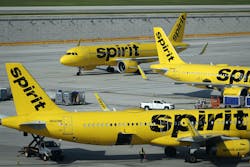Spirit Airlines Ends Proposed Deal With Frontier, Paves Way for Possible JetBlue Takeover
Spirit Airlines has ended its proposed merger with Frontier Airlines, clearing a path for JetBlue Airways to take over the South Florida-based discount carrier.
The move by Spirit and Frontier to abandon the deal was announced Wednesday as Spirit stockholders voted on the proposal. Despite Spirit’s continued support of the deal, which was first offered in early February, shareholders were on a path to turn it down.
“While we are disappointed that we had to terminate our proposed merger with Frontier, we are proud of the dedicated work of our Team Members on the transaction over the past many months,” Ted Christie, president and CEO of Spirit, said in a statement. “Moving forward, the Spirit Board of Directors will continue our ongoing discussions with JetBlue as we pursue the best path forward for Spirit and our stockholders.”
The Frontier offer was worth more than $2.6 billion in cash and stock, well below JetBlue’s all-cash buyout bid of $3.7 billion, which was aimed at taking over the entire airline. The Frontier offer would have established majority control for the Denver-based carrier.
Frontier said it is prepared to fly alone and grow on its own.
“While we are disappointed that Spirit Airlines shareholders failed to recognize the value and consumer potential inherent in our proposed combination, the Frontier Board took a disciplined approach throughout the course of its negotiations with Spirit,” said William A. Franke, chair of Frontier’s board and managing partner of Indigo Partners, Frontier’s majority shareholder. “We were focused on offering the appropriate value for Spirit, while prioritizing consumers and the best interests of Frontier, our employees and shareholders.”
JetBlue had no immediate comment.
The announcements by Spirit and Frontier came after months of haggling with JetBlue, which became an interloper in late March when it served up an offer that was repeatedly turned down by the Spirit board of directors.
The Spirit shareholders were voting Wednesday only on the $2.6 billion Spirit-Frontier proposal, not on the bid by JetBlue, which aggressively lobbied shareholders to reject the Frontier deal.
JetBlue’s offer is good through the close of business this Friday. Spirit could cut a deal with the New York-based carrier and talks between the two carriers were continuing.
Late Tuesday, Bloomberg, citing unidentified sources, reported that Frontier was still short of the votes needed, and that Spirit’s talks with JetBlue also had failed to result in an agreement. It was unknown what issues were preventing Spirit from opting for a JetBlue offer that on its face would produce more cash for shareholders than the Frontier deal.
Monthslong battle
The high-stakes saga started on Feb. 7 when Frontier offered nearly $3 billion in stock and cash to take majority control of Spirit.
Despite JetBlue’s higher monetary offer, Spirit repeatedly balked at the bid, saying it was unlikely to pass muster with federal regulators for competitive reasons.
In May, Spirit CEO Ted Christie told a CNBC interviewer that “you don’t need to be an antitrust attorney” to understand that the U.S. government is unlikely to permit a JetBlue takeover while the Justice Department continues a lawsuit to dissolve JetBlue’s Northeast marketing partnership with American Airlines over anti-competitiveness concerns.
On July 15, Institutional Shareholder Services, a leading proxy advisory firm, suggested that shareholders vote down the Frontier offer, which the airline declined to raise further.
“The provisions of the JetBlue proposal ... appear more favorable for Spirit shareholders than the best-and-final merger terms from Frontier,” the firm said. “Additionally, the present value of the JetBlue consideration exceeds the present value of the Frontier merger, and market volatility has made the certainty of value of JetBlue’s cash more attractive, relative to the potential upside of the Frontier deal.”
In the end, Frontier admitted that it lacked the shareholder votes necessary to swing a majority its way.
Growth, realignment continues
All three airlines serve South Florida’s international airports in Miami, Fort Lauderdale- Hollywood and West Palm Beach.
Spirit, which is based in Miramar, employs an estimated 3,400 people in the region, generates a considerable amount of economic activity in Broward, Palm Beach and Miami-Dade counties and is building a new corporate headquarters in Dania Beach.
Throughout the months of jousting, Spirit continued to pursue a growth strategy, setting up new crew bases in Miami, Atlanta and Houston. It also established a maintenance base in the Texas city.
Earlier this month, the U.S. Department of Transportation reassigned 16 peak hour runway slots to Spirit at Newark Liberty International Airport to add low-cost options to travelers using the New Jersey airport. The slots had been vacated by Southwest Airlines.
Two weeks ago, Spirit announced it finished upgrading its Wi-Fi services to cover its network across the U.S., Latin America and the Caribbean aboard its fleet, which was coveted by both of its suitors.
Spirit has said it plans to add 24 new A320neo jetliners this year “for a projected fleet-wide total of 197 by the end of the year, and 33 more new planes projected for delivery in 2023.”
By then, some analysts say, the airline may still be operating as an independent carrier regardless of who won the battle, as regulators assess the competitiveness of a newly formed carrier, and the winning bidder, if there is one, works its way through a lengthy integration process.
A Spirit combination with JetBlue would create the nation’s fifth-largest airline behind American Airlines, Delta Air Lines, Southwest Airlines and United Airlines, which collectively control roughly 80% of the U.S. air travel market, according to industry officials.
©2022 South Florida Sun-Sentinel. Visit sun-sentinel.com. Distributed by Tribune Content Agency, LLC.



